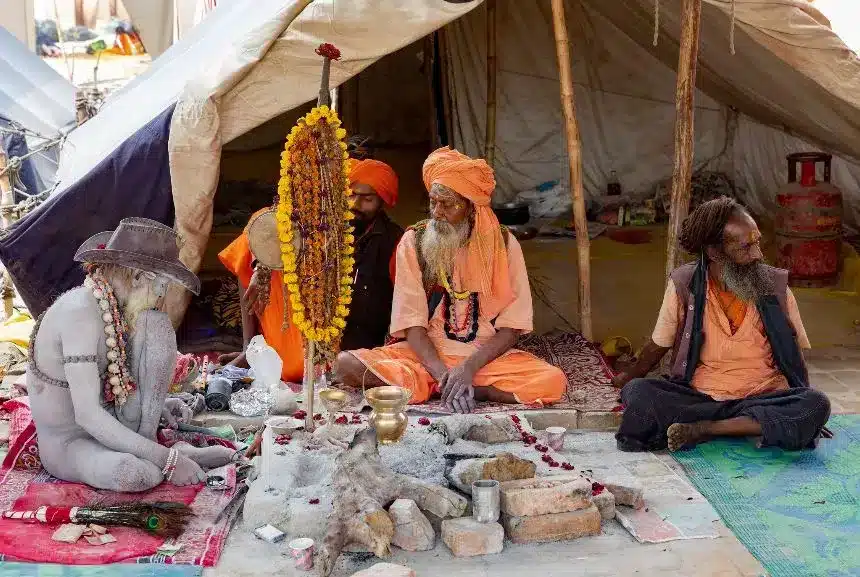Secular Balance: India’s Navigating Compass
In the vibrant democracy of India, the principle of secular balance serves as a guiding compass. This balance, crucial in a land of profound religious diversity, ensures that the right to free expression is harmonized with the respect for religious sentiments. The Indian Constitution, revered as a living document, enshrines this balance, mandating that while every individual has the freedom to speak, this freedom must coexist with the country’s collective conscience.
Here, secular balance is not just a legal doctrine but a societal ethos that permeates every aspect of public life. It empowers voices across the spectrum while safeguarding the multicultural fabric that is India’s identity. This intricate dance of democratic rights, with secular balance as its rhythm, makes India’s approach to freedom of expression a unique blend of respect for diversity and commitment to individual liberties.
Contextualizing Secular Balance
Secular balance in India is more than a constitutional mandate; it’s the cornerstone of its unity in diversity. India’s interpretation of secularism diverges from the Western archetype. Rather than a strict separation of religion and state, India’s secular ethos accommodates religious identities within the public sphere, affirming a commitment to pluralism.
Secular balance in India is a dynamic equilibrium.
The Indian Constitution acts as a canvas, illustrating the nuanced shades of secular balance. It upholds the right to freedom of expression, but not without boundaries. These boundaries are drawn not to suppress speech but to prevent the fracturing of a society rich in religious diversity. In this context, secular balance isn’t mere tolerance but an active engagement with the complexities of a pluralistic society. It reconciles the often conflicting demands of upholding individual rights and preserving collective harmony.
The legal framework in India is thus designed to reflect this balance. It is evident in the laws that govern speech and expression, tailored to consider the country’s socio-religious sensitivities. However, this balance is not static. The dynamism of India’s democracy necessitates that secular balance evolves with the society it serves. Legal precedents and public debates continuously reshape the contours of this balance, ensuring it remains relevant in the face of changing societal values.
Critically, secular balance in India is not an end in itself but a means to an inclusive end. It is a bridge between the past and the present, the individual and the collective, the sacred and the secular. It is the thread that weaves through the fabric of India’s polity, holding together a nation where myriad beliefs and opinions coexist.
This balance is India’s answer to the universal question of how to build a society where different truths can live side by side. It is a delicate equilibrium, one that demands constant vigilance and adjustment, ensuring that freedom of expression and religious sentiment support, rather than undermine, the tapestry of Indian society.
The Pillars of Secular Balance
In the heart of India’s democracy, two pillars stand firm, upholding the principle of secular balance: freedom of expression and religious harmony. These pillars are not adversaries but allies in fostering a society that values open dialogue and respects diverse faiths.
The Indian judiciary, recognizing the potential volatility of unbridled speech in a religiously diverse society, often interprets freedom of expression with a cautious lens. The balance struck here is delicate. On one hand, there’s a steadfast commitment to free speech as a fundamental right, essential for democracy’s vibrancy and the individual’s autonomy. On the other, there’s an understanding that this right must sometimes yield to the collective need for religious and communal harmony.
Laws and court rulings in India reflect this balance. They often draw a line at speech that could incite animosity or violence between communities. Critics argue this can lead to excessive caution, where the fear of offending religious sentiments may dampen legitimate dissent and discussion. Supporters, however, see it as a necessary moderation, a means to ensure that the nation’s secular fabric remains intact amidst competing religious narratives.
This secular balance is further manifested in public life, where festivals of various faiths are celebrated with equal fervor, yet with a conscious effort to avoid communal conflict. Education, too, plays a role, with curricula designed to foster mutual respect and understanding among young citizens of different faiths.
Thus, secular balance in India is a dynamic equilibrium. It requires an ongoing conversation between the individual’s right to express and society’s need for cohesion. As India continues to evolve, the pillars of secular balance stand as a testament to the nation’s commitment to maintain a democratic space that is both free and respectful, vibrant yet harmonious, and always navigating the complexities of a diverse society.
Secular Balance and the Public Sphere
Secular balance is a dynamic force in India’s public sphere, shaping the contours of national discourse. This balance ensures public debate remains robust yet respectful, allowing for a multitude of voices to coexist. In this arena, the government plays a nuanced role, navigating between protecting diverse religious sentiments and fostering a healthy environment for free speech.
Secular balance in India is more than a legal doctrine; it is a cultural narrative that shapes how Indians perceive their place in the world.
The challenge lies in managing the fine line where the right to express one’s opinions does not encroach upon another’s religious beliefs. India’s legal and cultural framework attempts to demarcate this boundary with care. Laws that govern expression aim to prevent speech that might escalate into communal unrest, safeguarding the public sphere from discord.
Educational policies and media regulations also reflect this secular equilibrium. Schools teach the importance of interfaith understanding, while the press is urged to report with sensitivity towards different communities. These measures are crucial for maintaining secular balance, as they help cultivate a citizenry that is informed and considerate of the diverse religious landscape.
Yet, this balance is not without its critics. Some view these protective measures as overreach, potentially hindering critical dialogue and dissent, which are essential to democracy. The debate, thus, continues, as India seeks to refine its approach to secular balance, ensuring that its public sphere remains a space for free, yet harmonious, exchange of ideas.
In essence, secular balance in India’s public sphere is about creating a space where diversity is not just tolerated but celebrated, where dialogue is encouraged but not at the cost of communal peace. It’s a balance that India continuously strives to perfect, knowing that the vitality of its democracy depends on it.
Reconciling Secular Balance with Human Rights
In India’s quest for secular balance, human rights emerge as both a guiding light and a field of tension. This balance reflects a deep understanding that the right to free speech is fundamental, yet not absolute when it intersects with the collective right to religious peace. Here, the commitment to human rights is viewed through a lens that considers the nation’s pluralistic character.
Legislation in India often embodies this principle, seeking to reconcile the universal human right to expression with the imperative to protect religious sentiments. This reconciliation is not a simple task; it requires a judicious interpretation of both legal mandates and the unwritten codes of societal conduct. The judiciary plays a critical role in this, often tasked with interpreting laws in ways that respect the country’s secular balance while aligning with international human rights standards.
This delicate act of balancing becomes especially pronounced in cases where speech and religious sentiment intersect. The Indian legal system, while adhering to the principle of secular balance, has crafted a narrative that places great emphasis on maintaining public order and morality. This narrative has evolved over time, through landmark cases and legislative changes, reflecting the country’s evolving understanding of the interplay between individual rights and collective responsibilities.
Secular balance, thus, is not merely a static legal concept but a living, breathing principle that adapts to the changing tides of societal norms and global human rights discourse. India’s approach is a testament to its commitment to mold universal human rights principles to fit its diverse societal fabric, ensuring that the rights of expression and religion are not just protected but also harmonized.
Concluding Reflections on Secular Balance
The concept of secular balance, pivotal to India’s societal framework, signifies more than a mere constitutional ideal—it is a lived experience that resonates with the ethos of the nation. As India navigates the intricacies of a diverse population, the harmonization of freedom of expression with religious sentiment becomes not just a legal obligation but a cultural pursuit.
This secular balance, while occasionally contentious, stands as a testament to India’s commitment to a democratic ethos that honors multiple truths. It acknowledges the complexity of governing a society where myriad beliefs and opinions seek expression. The balance is a reflection of India’s maturity, recognizing that the vibrancy of its democracy is intertwined with the ability to foster dialogue that is both free and respectful.
As India continues to evolve, the secular balance will undoubtedly face new challenges and interpretations. However, the core principle remains steadfast—upholding a democracy that celebrates diversity while fostering unity. This balance is not about silencing voices but about amplifying them in a manner that contributes to the nation’s collective narrative.
In the end, secular balance in India is more than a legal doctrine; it is a cultural narrative that shapes how Indians perceive their place in the world. It is an ongoing dialogue, a balance that is continuously sought after, and a principle that is deeply woven into the fabric of India’s identity. As the world observes, India’s endeavor to maintain this balance may offer insights into the universal pursuit of harmonizing freedom of expression with religious and cultural sensitivities.
Adapted from an academic article for a wider audience, under license CC BY 4.0









